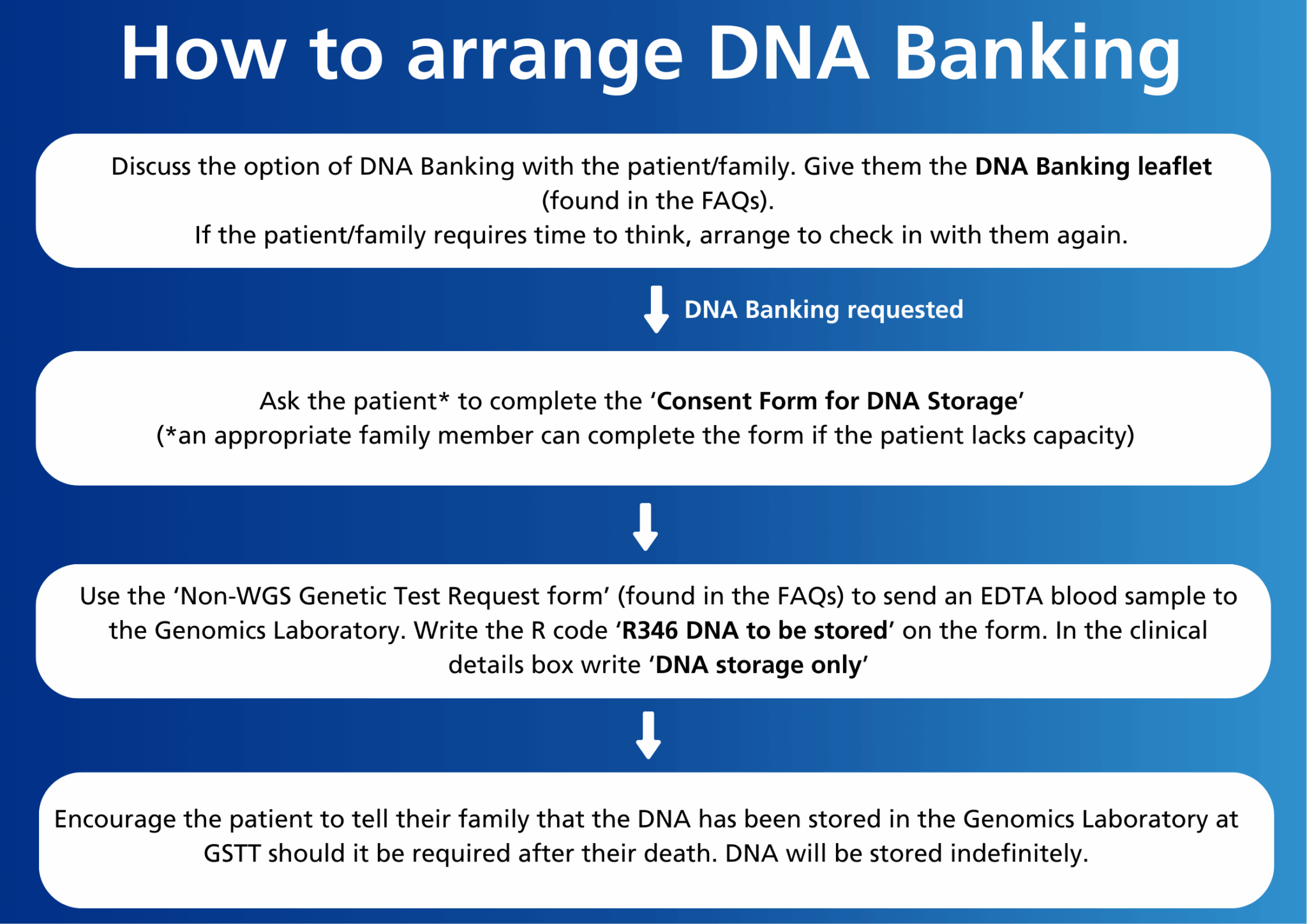Genomics in Palliative Care

Some patients receiving palliative care may have an undiagnosed genetic condition. This may be more likely if a relative has been diagnosed with a similar condition.
A genomic diagnosis will not usually change the management of a patient receiving palliative care. However, identifying a genomic cause of their disease may benefit their family members.
It is not always appropriate to offer genomic testing to patients receiving palliative care; patients may not want to know if there is a risk of their children developing similar symptoms, and family members are focussed on supporting their loved one. However, in the future, family members may wish to understand their own risk.
How can palliative care teams help?
Family members often explore genomic testing after their loved one has passed away. Sadly, many are told that genomic investigations are not possible because there is no stored DNA sample from their deceased relative.
Healthcare professionals can support families by offering them the opportunity to store a sample of the patient’s DNA. This sample will be stored for at least 20 years in an NHS Genomics laboratory, providing relatives with the opportunity to explore genomic testing* at a time that feels right for them.
*Genomic testing is only available according to eligibility criteria outlined in the National Genomic Test Directory. However, DNA storage may offer opportunity for future genomic testing if criteria change. We have identified some scenarios in which DNA Banking could be especially helpful- these are outlined in the FAQs below.
Possible advantages of DNA Banking & future Genomic Testing

Family members may better understand their chances of developing the condition

Asymptomatic relatives may be able to seek predictive genetic testing

Relatives may be offered additional health screening or risk-reducing interventions

Family members may be offered reproductive options, preventing future generations inheriting the condition
Ready to store a DNA sample?
If you already feel confident storing a DNA sample for your patient, click the button to arrange testing. If you need support the resources below should help you.

Download a Patient Information Booklet
Download our patient information leaflet. We recommend sharing this leaflet with your patient after you have discussed the option of DNA Banking
Download a Consent Form
Download a consent form to complete before storing a DNA sample. We recommend discussing each point on the form with the patient/family. This will help to ensure the patient/family understands the implications of DNA Banking.
Download a Blood Form
The blood form needs to be sent to the Genomics laboratory with the blood sample. Please write 'DNA storage only' in the 'Clinical Information' box.
Frequently asked questions
Any patient can store a DNA sample, but this is particularly helpful if there is a increased chance that there could be a inherited factor contributing to their condition, for example patients who have received a diagnosis of cancer, dementia or a neuromuscular disorder at a relatively young age. Please see below for further details and links.
Patients with cancer:
Whilst most cancers are not linked to an inherited gene variant, some patients with cancer are eligible for genomic testing. It may be helpful to discuss DNA banking with your patient if they meet the eligibility criteria for any of the following genomic tests:
- Ovarian cancer (without breast cancer) (R207)
- Inherited MMR deficiency (Lynch syndrome) (R210)
-
Inherited polyposis and early onset colorectal cancer (R211)
Patients with adult onset neurodegenerative disorders:
It may be helpful to discuss DNA banking with your patient if they meet the eligibility criteria for any of the following genomic tests:
Patients with Muscular Dystrophies:
There are many different forms of muscular dystrophy, and many genomic tests available. We have listed some of the most common tests below so that you can review the eligibility criteria. However, if you suspect that your patient has a muscular dystrophy, it could be helpful to store DNA. If your patient requests testing, Neurology should be consulted before any testing is activated.
- Myotonic Dystrophy type 1 (R72)
- Myotonic Dystrophy type 2 (R410)
- Neurodisability +/- epilepsy (R59)
- Hypertrophic cardiomyopathy (R131)
- Dilated cardiomyopathy (R132)
The list above is not exhaustive. If your patient has a different condition that appears to be familial, we would recommend consulting your local Clinical Genetics service for advice. We would also suggest consulting a specialist if you have any doubts. However, it may be helpful to store DNA in the meantime.
DNA Banking may be helpful in the following scenarios:
- A patient has a clinical diagnosis of a condition that may be inherited (see details above)
- A patient has a relative with a similar diagnosis
- A patient developed symptoms at a young age
- A patient has been told there may be a genetic factor contributing to their condition, but there is no genomic test available currently in the National Genomic Test Directory
- A patient has declined genomic testing. However, they would like to store a DNA sample so that their family have the option of testing the sample after their death.
If a patient has genomic testing, their DNA sample will be investigated to try to identify genomic variants that could be the cause of their condition. If a causative gene variant is identified, the patient will receive a genetic diagnosis.
In DNA banking, the DNA sample will be stored by the NHS Genomics laboratory. However, no genomic investigations will be initiated.
If genomic testing is required in the future, this will be discussed with the patient/family prior to initiating testing. This is because it is important that the patient/family understands potential implications of genomic testing and gives informed consent before testing is activated
Genomic testing can only be offered according to eligibility criteria outlined in the National Genomic Test Directory. However, our knowledge and understanding of genomics is constantly improving and the National Genomic Test Directory is regularly updated. It may be possible for your patient’s stored DNA sample to undergo genomic testing in the future even if they don’t currently qualify for testing.
It is important to ensure that patients and families are aware that storing a DNA sample does not guarantee that the family will be offered testing.
Our patient leaflet explains the benefits and limitations of DNA Banking. We recommend sharing the leaflet after having a conversation with the patient/family. Download the patient leaflet using the button above the FAQs.
It is important that the patient and their family understands the possible benefits and limitations of DNA Banking. It is especially important that they appreciate that storing a DNA sample now does not guarantee that they will be offered genomic testing in the future.
We recommend that you share our patient leaflet with the patient/their family. This can be downloaded using the button above the FAQs.
The patient should also complete a consent form before DNA is banked. The consent form can be downloaded using the button above the FAQs.
We encourage patients to tell their relatives that a DNA sample has been banked so the family know where the sample is stored should it be needed in the future.
Before arranging DNA Banking, you should discuss the process with the patient/family. You can use the DNA Banking leaflet and Consent Form for DNA Storage to help with this. These documents can be downloaded using the button above the FAQs.
You then need to complete a Non-WGS Rare Disease Order form (accessed using the link above the FAQs) and obtain a blood sample in an EDTA tube (purple top)
The Non-WGS Rare Disease Order form and blood sample should be sent to:
Genetics Laboratory
5th Floor Tower Wing
Guy’s Hospital
London
SE1 9RT
You can download a patient leaflet using the button above the FAQs.
We recommend sharing the leaflet after discussing DNA Banking with the patient/family. This gives the patient consider the option of DNA Banking.
It is helpful for patients to share the leaflet with their family members.
Before storing a sample of your patient’s DNA, you should take consent. If the patient lacks capacity, consent should be taken from an appropriate family member. Use the Consent Form for DNA Storage (found above the FAQs) to record this discussion.
We recommend giving the patient/family a copy of our DNA Banking leaflet (found above the FAQs) before taking their consent for DNA storage.
The consent form and patient leaflet can be downloaded using the buttons above the FAQs.
Use our Non-WGS Rare Disease Order form to send your DNA sample to the Genomics Laboratory.
You should write the R code ‘R346 DNA to be stored’ on the form. In the clinical details box write ‘DNA storage only’
You can download a copy of the Non-WGS Rare Disease Order form using the button above the FAQs.
The sample should be collected in an EDTA tube (purple top)
If there are difficulties collecting a blood sample, it may be possible to send a saliva sample.
Write ‘for DNA Storage Only‘
The Test Directory ID number (or R code) is R346 DNA to be stored
If the patient/family wishes to consider arranging genomic testing of the stored sample during the patient’s lifetime, they can discuss this with the patient’s medical team. The patient must meet the eligibility criteria outlined in the National Genomic Test Directory, and give their consent for testing.
If a patient requests testing in place of DNA banking, it is helpful to discuss this with the relevant clinical team. The National Genomic Test Directory outlines which specialties are able to order each test. This information can also be found using our ‘Order or Find a Test’ Directory The referring clinician must state how the patient meet eligibility criteria for that specific test.
If the family wish to consider testing the stored sample after their relative’s death, they can ask their GP to refer them to their local Clinical Genetics service.
We would recommend banking a DNA sample even the patient intends to donate their organs to medical research. Genomic testing usually requires a sample that has been processed by a NHS laboratory; research samples may not be subjected to the same rigorous controls. Furthermore, research samples may be stored in chemicals that damage DNA.
The DNA will be stored in the NHS Genomics Laboratory for at least 20 years. Stored DNA samples can only be accessed by teams working in the laboratory. They are not be available to research groups.
Sometimes stored samples are used anonymously by the laboratory team for the development of genetic tests and quality checks.
If you cannot find the answer to your question on this page, you can contact gstt.southeastglh@nhs.net for support.
Want to learn more about Genomics?
Visit some more of our webpages to learn how you can harness the potential of genomics for patients and their families!
